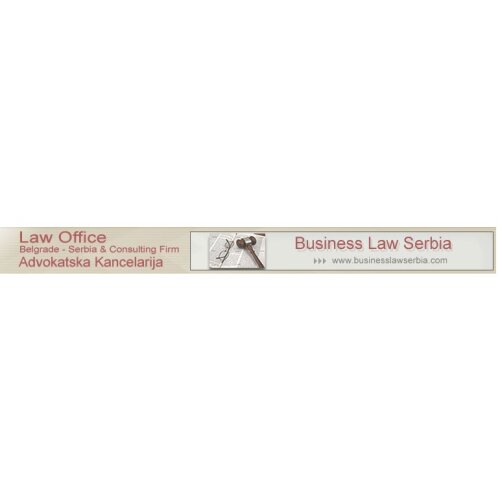Best Wrongful Termination Lawyers in Serbia
Share your needs with us, get contacted by law firms.
Free. Takes 2 min.
Or refine your search by selecting a city:
List of the best lawyers in Serbia
Legal guides written by Business Law office - Advokatska Kancelarija:
- Why Invest In Serbia
About Wrongful Termination Law in Serbia
Wrongful termination in Serbia refers to situations where an employee is dismissed from their job in a manner that violates Serbian labor laws or their employment contract. Serbian employment laws provide a framework to protect employees from unfair dismissal, emphasizing that employment can only be terminated under legally justified conditions. This includes dismissal for just cause, redundancy, or mutual agreement. Employees who feel they have been wrongfully terminated have legal avenues available to challenge their dismissal and potentially secure remedies such as reinstatement or compensation.
Why You May Need a Lawyer
There are several scenarios where you might need legal assistance for wrongful termination in Serbia:
- Unjust Dismissal: If you believe you were terminated without a valid legal reason.
- Breach of Contract: If your termination violated the terms specified in your employment agreement.
- Discrimination: If you suspect your termination was due to discriminatory reasons such as gender, race, age, or disability.
- Retaliation: If you were dismissed for exercising your legal rights, such as whistleblowing or filing a complaint against the employer.
- Unsatisfactory Severance: If you believe the severance package offered does not comply with legal standards or your contract.
Local Laws Overview
The key aspects of Serbian laws relevant to wrongful termination include:
- Labor Law: Defines conditions and procedures for lawful termination, mandating a valid reason and a proper notice period.
- Anti-Discrimination Law: Prohibits dismissal based on discriminatory grounds such as ethnicity, gender, age, or religion.
- Collective Agreements: May provide additional protections and stipulations regarding termination procedures.
- Employment Contract: Custom contracts that include specific clauses related to termination that must be honored.
- Legal Procedures: Employees can initiate proceedings before a competent court or labor inspectorate if they suspect unlawful dismissal.
Frequently Asked Questions
What constitutes wrongful termination in Serbia?
Wrongful termination occurs when an employment contract is ended in a way that breaches local labor laws or violates contractual terms.
What should I do if I think I have been wrongfully terminated?
Gather all relevant documentation, including employment contracts and correspondence related to your dismissal, and seek legal advice from a qualified lawyer specialized in labor law.
How long do I have to file a claim for wrongful termination?
In Serbia, you generally have 90 days from the date of termination to file a claim with the competent authorities or the court.
Can I get my job back after a wrongful termination claim?
While reinstatement is possible, it often depends on the circumstances of the termination and the outcome of legal proceedings.
Will I receive compensation if my claim is successful?
If wrongful termination is proven, you may be entitled to compensation for lost wages, legal fees, and possible damages.
Does a verbal termination have the same legal weight as a written one?
Terminations should be documented in writing to be legally valid. Verbal terminations can be challenged, especially if they contravene legal requirements.
What role does a labor union play in wrongful termination cases?
Labor unions can offer support, guidance, and representation in disputes over wrongful termination, often providing an additional layer of negotiation.
Are there any special considerations for temporary or part-time workers?
Part-time and temporary workers have similar protections under the labor law, but specific terms may vary according to their contracts.
Can an employer terminate an employee without notice?
No, except for severe misconduct or gross negligence. Otherwise, the law requires a notice period aligned with the employment contract or statutory provisions.
Is mediation an option in wrongful termination disputes?
Mediation is often encouraged as a first step to resolve disputes amicably without proceeding to formal legal action.
Additional Resources
For more support on wrongful termination issues in Serbia, consider contacting:
- Ministry of Labour, Employment, Veteran, and Social Policy: Provides guidance on labor laws and rights.
- Labor Inspectorate: Assists with reporting labor law violations and conducts investigations.
- Trade Unions: Offer resources and support for collective labor rights and individual grievances.
- Legal Aid Clinics: Provide free or low-cost legal advice to individuals with limited resources.
Next Steps
If you need legal assistance for a wrongful termination issue in Serbia, follow these steps:
- Document Everything: Keep records of all communications, contracts, and any other relevant documents.
- Consult a Lawyer: Reach out to a lawyer specializing in labor law to evaluate your case.
- Consider Mediation: Engage in informal negotiations or mediation to seek an amicable resolution with your employer.
- File a Claim: If necessary, file a complaint with the labor inspectorate or initiate legal proceedings in court within the specified time frame.
Acting swiftly and informedly is crucial to ensuring your rights are protected and adequately addressed in a wrongful termination case.
Lawzana helps you find the best lawyers and law firms in Serbia through a curated and pre-screened list of qualified legal professionals. Our platform offers rankings and detailed profiles of attorneys and law firms, allowing you to compare based on practice areas, including Wrongful Termination, experience, and client feedback.
Each profile includes a description of the firm's areas of practice, client reviews, team members and partners, year of establishment, spoken languages, office locations, contact information, social media presence, and any published articles or resources. Most firms on our platform speak English and are experienced in both local and international legal matters.
Get a quote from top-rated law firms in Serbia — quickly, securely, and without unnecessary hassle.
Disclaimer:
The information provided on this page is for general informational purposes only and does not constitute legal advice. While we strive to ensure the accuracy and relevance of the content, legal information may change over time, and interpretations of the law can vary. You should always consult with a qualified legal professional for advice specific to your situation.
We disclaim all liability for actions taken or not taken based on the content of this page. If you believe any information is incorrect or outdated, please contact us, and we will review and update it where appropriate.
Browse wrongful termination law firms by city in Serbia
Refine your search by selecting a city.

















